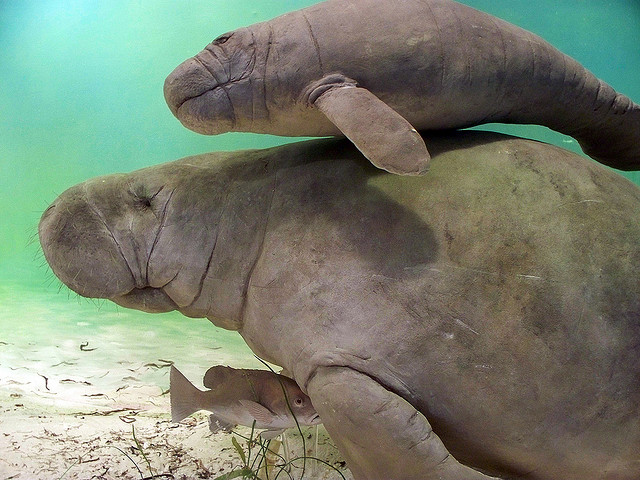
The Fish and Wildlife Service (FWS) started off 2016 by removing the manatee from the Endangered Species Act (ESA) designation of “endangered” to the lesser designation of “threatened.” In a notice in the Federal Register published after the announcement, the FWS noted that manatee populations have seen gains such that there is a “very low percentage chance of this animal going extinct in the next 100 years.” However, the FWS noted one of the more pressing threats to the manatee resurgence would come from President Obama’s carbon regulations under the Clean Power Plan.
It’s no secret the President’s carbon regulations will force the premature retirement of coal-fired power plants across the U.S. In fact the President seems wholly indifferent to the thousands of jobs and livelihoods he’s destroying. However what the President and EPA did not count on is that some of the power plants that will be shuttered are integral to the survival of hundreds of Florida manatees.
The issue stems from the fact that the warm-water discharge from some Florida coal-fired power plants, such as Florida’s Big Bend Power Station, has become home to hundreds of West Indian manatees. The manatees are drawn to the warm-water discharge for a nearly six-month period in the winter.
The FWS’s notice on the manatee’s new ESA designation stated, “Within the Southeastern United States, the potential loss of warm water at power plants…used by wintering manatees is identified as a significant threat.” The FWS went on to point out that “addressing the pending loss of warm water habitat from power plant discharges remains a priority activity needed to achieve recovery.”
The FWS’s concerns are echoed in a 2013 study on manatee habitat loss, which found “Experience with past shut-downs of power plant and industrial outfalls suggest that a potentially large portion of manatees accustomed to using them will remain near those sites rather than move long distances to find a comparable site.” The study went on to state that “unless another suitable refuge is nearby…many are likely to sustain high rates of cold-stress death when plants close” and thus “plant retirements are recognized as a significant long-term threat to Florida manatees.”
In drafting the Clean Power Plan, the neither President nor EPA took these impacts into consideration as would otherwise be required under the Endangered Species Act. “This is troubling for the manatee, but even more disturbing is the possibility that the Obama administration would strategically disregard the law when it serves their interests or the President’s legacy,” said Julia Bell, press secretary for the House Natural Resources Committee.
The EPA has deflected charges the Agency failed to take into account the impact on certain endangered species like the Florida manatee, instead arguing the choice to close such power plants will be left to the states. However this argument holds little water given the Clean Power Plan’s compliance standards leave states with almost no “choice” but to shutter the plants.
While the outcome of this dilemma is still unclear, what is overwhelmingly clear is that nothing, not the destruction of thousands of people’s livelihoods or even the Endangered Species Act, will prevent the President from doing what he has to do to preserve his legacy.
Photo credit: Psyberartist

